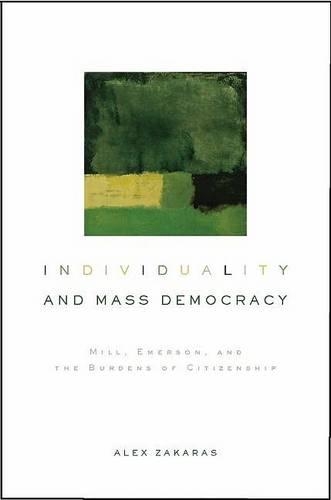
Individuality and Mass Democracy: Mill, Emerson, and the Burdens of Citizenship(English)
Series: English
Democracy, unlike any other form of government, demands that citizens take responsibility for their politics. And yet, over the past fifty years, observers of American democracy have worried that Americans are failing to do so. With occasional exceptions, voter turnout and civic engagement are declining, and the average citizen's knowledge of public affairs is flimsy at best. Citizens' political p
NaN
VOLUME
English
Hardback

Democracy, unlike any other form of government, demands that citizens take responsibility for their politics. And yet, over the past fifty years, observers of American democracy have worried that Americans are failing to do so. With occasional exceptions, voter turnout and civic engagement are declining, and the average citizen's knowledge of public affairs is flimsy at best. Citizens' political posture is mostly passive: they receive political propaganda designed by marketing professionals and consume staged political spectacles that are scarcely distinguishable from other forms of "reality" entertainment. The Rockwellian ideal of democracy-participatory, deliberative, egalitarian-that still captivates our imaginations is for the most part anachronistic. How should we respond to these worries? Alex Zakaras argues that we must develop an ideal of citizenship suitable for mass society. To do so, he turns to a pair of nineteenth-century philosophers--John Stuart Mill and Ralph Waldo Emerson--who were among the first to confront the specific challenge of making mass democracy work, and whose moral and political insights are deeply relevant to America today. He focuses especially on the idea of individuality, which lies at the very center of their theories of democracy. Individuality emphasizes each citizen's personal complicity in the injustices committed by democratic officials, and calls on each of us to resist such complicity by speaking and acting against injustice. Individuality suggests that those of us who do no more than vote--who otherwise lead strictly private lives--are guilty of moral and civic negligence.Table of Contents: PART 1: DEMOCRATIC INDIVIDUALITY ; 1. Responsible Citizenship ; 2. Docility and Democracy ; 3. The Ideal of Individuality ; PART II: EMERSON ; 4. The Docile Individual ; 5. Emersonian Transitions ; 6. Withdrawal from Complicity ; PART III: MILL ; 7. Conformity and Subjection ; 8. The Active Mind ; 9. Individuality and Civic Virtue ; PART IV: CONCLUSION ; 10. The Burdens of Citizenship ; KEY TO REFERENCES ; BIBLIOGRAPHY
Price Comparison [India]
In This Series
Bestseller Manga
Trending NEWS




















